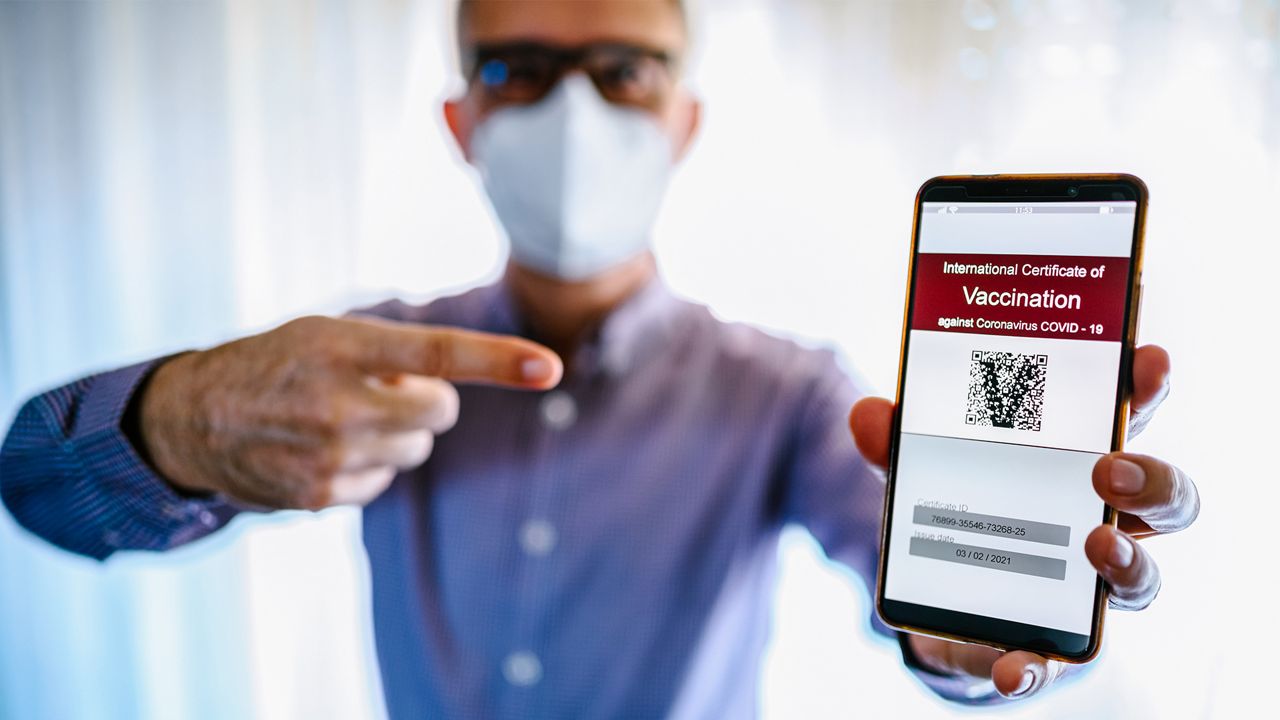LOS ANGELES — Who’s been inoculated against coronavirus and who hasn’t? That’s the question more governments and airlines will want answered to ensure safe travels as vaccinations continue their slow and unsteady rollout across the globe.
It’s also the question an international collaborative is hoping to answer with a new digital health credential system called the Good Health Pass. On Tuesday, members of a cross-sector initiative that includes businesses, airlines, policymakers, the health care industry, and high tech outlined the steps they are taking to make an individual’s COVID test results and vaccination certificates as easy to use as a credit card anywhere in the world.
“When it comes to international travel, there is an urgent and compelling need for digital health certificates to prove one’s test results or, increasingly, vaccination,” said Dakota Gruener, executive director of ID2020, a public-private partnership based in San Francisco that promotes privacy-protecting, and portable, digital identity systems. “Many efforts are being implemented by different airports and airlines with different solutions providers, but without guidance around standards, there’s a real risk of fragmentation.”
The Good Health Pass Collaborative acknowledges that there are already several efforts in the works to develop vaccination and test certificates for global travel, including Health Pass by Clear in use at Los Angeles International Airport, and CommonPass, used by United Airlines on some of its international flights. The World Health Organization is also working on a digital vaccine certificate.
The goal of the Good Health Pass is to help stitch them together, so they work seamlessly across geographical borders, similar to a passport, in an effort to restore air travel and the global economy.
Airlines lost $118.5 billion last year, according to the International Air Transport Assn.; another $38.7 billion in losses are expected in 2021.
“Our interest in this is to get the industry moving again, and to get it moving in a way that can invoke trust from governments and passengers,” said Michael Rossell, senior vice president of Airports Council International, the group that develops standards, policies, and recommended practices for 2,000 airports around the world, from huge travel hubs like Heathrow in London to small players in the Galapagos Islands.
“This is not a first world game. It’s a whole world game” said John Denton, secretary general of the International Chamber of Commerce, which represents 45 million businesses around the world. He said $1 trillion had so far been lost in tourism and travel revenue due to COVID, but $9 trillion could be lost without vaccinations.
“People should be aware that in the U.S. right now, if we’re getting vaccinated, we’re being handed a paper card that if you’re lucky has your name on it. It has a stamp and a handwritten name of who gave the vaccine,” said Mike Nash, chief executive officer of the health information logistics company, Lumedic, owned and operated by one of the largest health care systems in the country: Providence. “That’s right now the standard of standards and security for vaccine passports in the U.S.”
Paper-based credentials not only run the risk of being lost, but they can also expose an individual’s sensitive personal information and be susceptible to fraud. Developing a digital system that works across geographies and institutions in a way that retains privacy and security is key.
Lumedic is one of 25 entities participating in the Good Health Pass collaboration, including IBM and Mastercard, to create best practices and standards, Nash said, “to get this digital information into the economy and into the U.S. and into patients’ hands.”
And to do it in a way that protects privacy but also does so quickly.
Creating an internationally recognized global passport system took decades, said Drummond Reed, chief trust officer for the digital identity software provider, and Good Health Pass Collaborative co-founder, Evernym. To create a digital global health pass, he said, “We have months. We need to arrive at something that's as interoperable as a global passport as fast as we can in order to help open the economy.”



